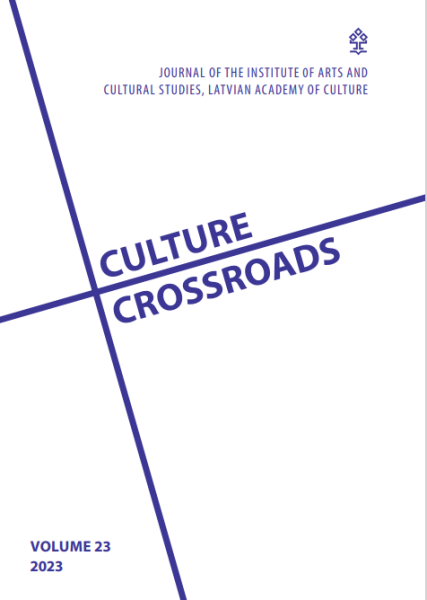THE CONDITIONAL GIFT – INTERPRETATIONS OF PUBLIC PARTICIPATION IN APPLYING FOR THE EUROPEAN CAPITAL OF CULTURE STATUS
DOI:
https://doi.org/10.55877/cc.vol23.401Keywords:
ECoC status, public participation, cultural planning, digital participationAbstract
European cities compete for the status of the European Capital of Culture (ECoC), as it is proven to enhance city visibility and the profile of cultural events in the city; it also allows addressing issues of strategic cultural development of the successful candidate. Importantly, the status comes with an explicit requirement to ensure sufficient public participation in developing the bid and implementing the cultural programme. Prior research demonstrates that meaningful participation is not easy to achieve; the research on that aspect is considered scarce.
The article aims to analyse the interpretation of public participation, its challenges and shaping factors as seen by ECoC bid-producing teams. The main research question is “What did the bid development process uncover about the capacity of bid-producing teams to foster public participation in the Latvian cities – ECoC finalists?”
The current paper examines the challenge of participation encountered in the process of developing the bid for the second round of ECoC 2027 by three applying cities in Latvia. The study was carried out between October 2022 and March 2023 using qualitative methodology. The theoretical starting point of the study is the four-part framework of factors influencing participation by Kaifeng Yang and Sanjay K. Pandey [Yang & Pandey 2011]. The study suggests that these factors are indeed useful in conducting an analysis of participation. In addition, the study supports the prior conclusions of scholarly literature pointing out that more nuanced language is needed to interpret participation and participants. The article pays special attention to the nuances of digital participation and the organisational characteristics of the public body in charge of participation in cultural planning.
Downloads
References
Biondi, L., Demartini, P., Marchegiani, L., et al. (2020). Understanding orchestrated participatory cultural initiatives: Mapping the dynamics of governance and participation. Cities, Vol. 96. DOI: https://doi.org/10.1016/j.cities.2019.102459.
Campbell, P. (2011). Creative industries in a European Capital of Culture. International Journal of Cultural Policy, 17(5), pp. 510–522. DOI: 10.1080/10286632.2010.543461
Centrālā statistikas pārvalde / Central Statistical Bureau (2022). Iedzīvotāju skaits un tā izmaiņas. Available: https://stat.gov.lv/lv/statistikas-temas/iedzivotaji/iedzivotaju-skaits/247-iedzivotaju-skaits-un-ta-izmainas (viewed 9.11.2022.)
European Parliament (2014). Decision No 445/2014/EU of the European Parliament and of the Council of 16 April 2014. Available: https://eur-lex.europa.eu/legal-content/EN/TXT/?uri=CELEX%3A32014D0445 (viewed 4.11.2022.)
Expert Panel’s report (2022). Selection of the European Capital of Culture (ECoC) in 2027 in Latvia. Selection Stage. Available: https://www.km.gov.lv/lv/media/25853/download (viewed 7.11.2022.)
Ianniello, M., Iacuzzi, S., et al. (2018). Obstacles and solutions on the ladder of citizen participation: a systematic review. Public Management Review, 21(1), pp. 1–26. DOI:10.1080/14719037.2018.1438499
Jancovich, L., Ejgod Hansen, L. (2018). Rethinking participation in the Aarhus as European Capital of Culture 2017 project. Cultural Trends, 27(3), pp. 1–14. DOI: 10.1080/09548963.2018.1473951
O’Callaghan, C., Linehan, D. (2007). Identity, politics and conflict in dockland development in Cork, Ireland: European Capital of Culture 2005. Cities, 24(4), pp. 311–323. Available: https://doi.org/10.1016/j.cities.2007.01.006
Piber, M., Biondi, L., Demartini, P., et al. (2017). Pursuing civic engagement through participatory cultural initiatives: mapping value creation, outcome, performance and legitimacy. In: J. C. Spender, G. Schiuma, T. Gavrilova (eds.). Knowledge Management in the 21st Century: Resilience, Creativity and Co-creation. pp. 731–748. Available: https://www.researchgate.net/publication/320853243_Pursuing_Civic_Engagement_through_Participatory_Cultural_Initiatives_mapping_value_creation_outcome_performance_and_legitimacy
Pilsonības un migrācijas lietu pārvalde / Office of Citizenship and Migration Affairs (2021). Iedzīvotāju skaits pašvaldībās pēc nacionālā sastāva. Available: https://www.pmlp.gov.lv/lv/media/2905/download?attachment (viewed 09.11.2022.)
Tommarchi, E., Ejgod Hansen, L., Bianchini, F. (2018). Problematising the question of participation in Capitals of Culture. Journal of Audiences and Reception Studies, 15(2), pp. 154–69. Available: https://www.participations.org/15-02-10-tommarchi.pdf
Valmieras ziņas (2021). Cilvēku foto projektā “INSIDE OUT” vecā katlumāja un tornis pārtop par mākslas objektu. Available: https://www.valmieraszinas.lv/cilveku-foto-projekta-inside-out-veca-katlumaja-un-tornis-partop-par-makslas-objektu/ (viewed 27.01.2023.)
Yang, K., Pandey, S. K. (2011). Further Dissecting the Black Box of Citizen Participation: When Does Citizen Involvement Lead to Good Outcomes? Public Administration Review, 71(6), pp. 880–892. Available: https://doi.org/10.1111/j.1540-6210.2011.02417.x
Downloads
Published
Issue
Section
License
Copyright (c) 2023 Culture Crossroads

This work is licensed under a Creative Commons Attribution 4.0 International License.


